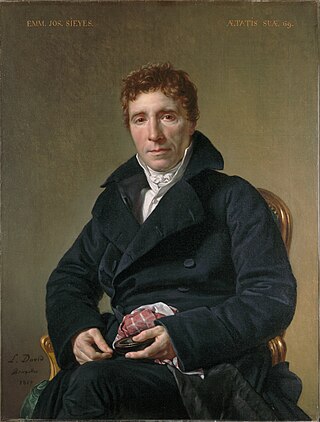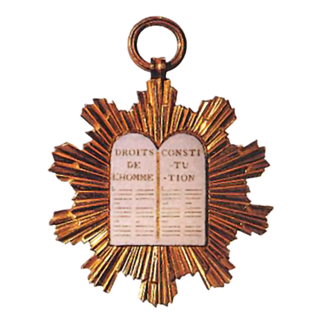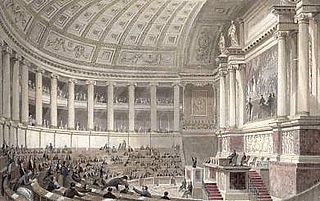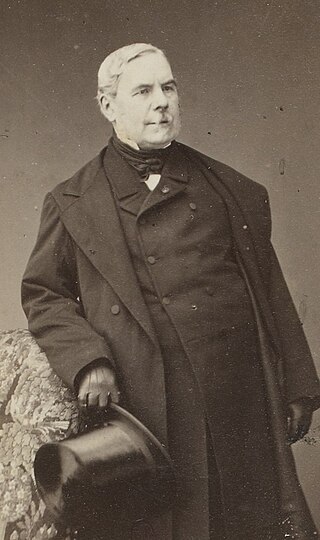
The president of France, officially the president of the French Republic, is the executive head of state of France, and the commander-in-chief of the French Armed Forces. As the presidency is the supreme magistracy of the country, the position is the highest office in France. The powers, functions and duties of prior presidential offices, in addition to their relation with the prime minister and government of France, have over time differed with the various constitutional documents since the Second Republic.
In politics, a national assembly is either a unicameral legislature, the lower house of a bicameral legislature, or both houses of a bicameral legislature together. In the English language it generally means "an assembly composed of the representatives of the nation." The population base represented by this name is manifestly the nation as a whole, as opposed to a geographically select population, such as that represented by a provincial assembly. The powers of a National Assembly vary according to the type of government. It may possess all the powers of government, generally governing by committee, or it may function solely within the legislative branch of the government.

Emmanuel Joseph Sieyès, usually known as the Abbé Sieyès, was a French Roman Catholic abbé, clergyman, and political writer who was the chief political theorist of the French Revolution (1789–1799); he also held offices in the governments of the French Consulate (1799–1804) and the First French Empire (1804–1815). His pamphlet What Is the Third Estate? (1789) became the political manifesto of the Revolution, which facilitated transforming the Estates-General into the National Assembly, in June 1789. He was offered and refused an office in the French Directory (1795–1799). After becoming a director in 1799, Sieyès was among the instigators of the Coup of 18 Brumaire, which installed Napoleon Bonaparte in power.

The prime minister of France, officially the prime minister of the French Republic, is the head of government of the French Republic and the leader of the Council of Ministers.

The National Assembly is the lower house of the bicameral French Parliament under the Fifth Republic, the upper house being the Senate. The National Assembly's legislators are known as députés, meaning "delegate" or "envoy" in English; etymologically, it is a cognate of the English word deputy, which is the standard term for legislators in many parliamentary systems).

The Legislative Assembly was the legislature of the Kingdom of France from 1 October 1791 to 20 September 1792 during the years of the French Revolution. It provided the focus of political debate and revolutionary law-making between the periods of the National Constituent Assembly and of the National Convention.

During the French Revolution, the National Assembly, which existed from 17 June 1789 to 9 July 1789, was a revolutionary assembly of the Kingdom of France formed by the representatives of the Third Estate (commoners) of the Estates-General and eventually joined by some members of the First and Second Estates. Thereafter, it became a legislative body known as the National Constituent Assembly, although the shorter form was favored.

Chamber of Deputies was a parliamentary body in France in the nineteenth and twentieth centuries:

Georges Vincent Antoine Fenech is a French former magistrate and politician. A member of The Republicans (LR), he represented the 11th constituency of the Rhône department in the National Assembly from 2002 to 2008 and again from 2012 until 2017. He has been a legal affairs consultant for the CNews television channel since 2017.
Alain Marc is a member of the French Senate, who represents the department of Aveyron.

Alain Néri is a French politician. He was the deputy for Puy-de-Dôme's 2nd constituency from 1997 to 2011 in the National Assembly of France. He was then senator for Puy-de-Dôme from 2011 to 2017. He is a member of the Socialiste, radical, citoyen et divers gauche.

Jacques Grosperrin is French politician of The Republicans who has been a member of the Senate since the 2014 elections, representing the Doubs department. Previously he served as a member of the National Assembly of France from 2007 until 2012.

Jean-Paul Garraud is a French politician serving as a Member of the European Parliament (MEP) since 2019. A cofounder of The Popular Right, he is former member of the National Assembly, where he represented the 10th constituency of Gironde from 2002 to 2012.

Philippe Folliot is a French politician who serves as a member of the National Assembly of France, representing the Tarn department. He is the founder of the Centrist Alliance.

Stéphane Demilly is a French politician of the Union of Democrats and Independents (UDI) who served as a member of the National Assembly of France from 2002 until 2020, representing the Somme department.

François Calvet is a French politician, a member of the National Assembly. He represents the Pyrénées-Orientales department, and is a member of the Union for a Popular Movement. On 25 September 2011 he was elected senator of the Pyrénées-Orientales and therefore leaves the National Assembly. His deputy is Jean-Pierre Romero, mayor of Port-Vendres. He is a member of the Study Group on the question of Tibet of National Assembly.

The 4th constituency of the Sarthe is a French legislative constituency in the Sarthe département.

Napoléon, comte Daru, was a French soldier and politician.

The politics of France take place with the framework of a semi-presidential system determined by the French Constitution of the French Fifth Republic. The nation declares itself to be an "indivisible, secular, democratic, and social Republic". The constitution provides for a separation of powers and proclaims France's "attachment to the Rights of Man and the principles of National Sovereignty as defined by the Declaration of 1789".
The Provisional Consultative Assembly was a governmental organ of Free France that operated under the aegis of the French Committee of National Liberation (CFLN) and that represented the resistance movements, political parties, and territories that were engaged against Germany in the Second World War alongside the Allies.
















